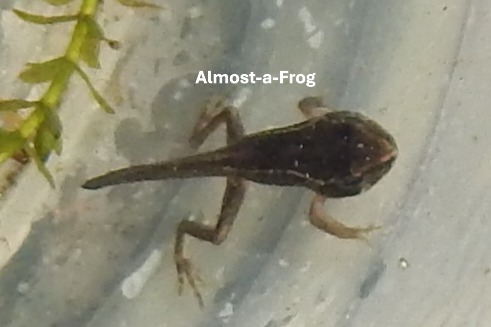In the early hours of Monday (7 July) through to 8am, we had 21 mm of rain as measured on our rain gauge. The average for July is 41 mm; so that’s half a month’s rain in one day day. It gave the ground a good soaking. I examined the earth with a trowel and the rain had soaked down several inches. But with this hot weather, that valuable rain will soon evaporate. Thursday was 30 degrees, Friday 31, today 29, and for the coming week the temperature will stay in the high 20s. The BBC forecast for the next ten days has not one of them with any rainfall. But plenty of heat.
Heat kills. The record breaking summer of 2022 when the temperature reached 40 degrees in Lincolnshire, excess deaths were close to 3000. Scientists say this is likely to be the new normal by the 2050s. Dr Ashkay Deoras of the University of Reading, says: If floods and storms are the loud alarms of climate change, extreme heat is its silent killer.
Monday’s rain replenished our barrels somewhat, but with no rain for some while, that won’t last long in this heat wave. This is climate change in action with the UK becoming more like southern Europe as was, as southern Europe’s heat is now like that of north Africa. These, though, are the early years of climate change, with currently 1.4 degrees of warming. The way things are going, with the world’s fossil fuel use still on the rise, 3 degrees of warming is becoming increasingly likely, with the worse case scenario giving us a 4.3 degree rise by the end of the century.
Our Sunday talk was by Rob DeRoche on Queer Gardening. There have been many gay gardeners including Ellen Willmott (1890s), Vita Sackville-West (1920 & 30s), Constance Spry (1950s), Derek Jarman (1990s), to modern days Brigitte Baptiste from Columbia, who considers that queerness and ecology are linked together. In more restrictive days, secret lovers might share violet posies, which is likely the origin of the insult – pansies for homosexuals. Many plants dance between the sexes, getting the best from them. An example is Acers which have flowers that change sex depending on the conditions. We may be hung up over sex, but nature isn’t.
It was a stimulating talk that got us chatting over tea post the talk. The next talk is: AI Friend or Foe, by Henry Dampier, on Sunday, 20 July from 2.30 pm.
There are still tadpoles in the pond. Some will stay that way, and will over winter in the pond, to develop in the spring. Though, I spot one which is almost a frog. It has hind legs, front legs too, a frog shaped head, but a long tadpole tail. The tail will be absorbed in the next week or two, and it will then be a froglet. The froglet will leave the pond, and not return for two years, when it will be a mature adult. I hope there’s some rain about at the time the creature leaves, or the froglet will likely dry out in the heat. It must stay damp to survive.
Nature is not a caring mother, she shrugs off the high mortality rates of her offspring, like a nurse in a Victorian baby farm. Ten thousand eggs in the frog spawn in early spring will result, at the end of the cycle, in about ten mature adults, the remnant dying in myriad ways: eaten by birds or foxes, by disease, drying out, or squashed. If there is any choice in reincarnation, my advice is: decline the offer of being born again as a tadpole.
The globe thistles have become blue prickly globes. I see them as planets and we have a veritable solar system of them. Or rather, so many in the cluster, it is more like the asteroid belt between Mars and Jupiter. The plum tree quite near them has no plums this year, whereas last year it had quite a few. What happened? Were the flowers blown away in the wind? Though, the apricot tree which pokes over our door fence, at the back by the pond, has been in full fruit, pale orange clusters, some apricots falling in the pond, some just outside.
There’s quite a few bunches of tiny grapes dangling from the vine over our small pergola, so that hasn’t suffered. And I am keeping an eye on the walnuts, all six of them, five more than we had ever had before. Our small fruit trees have apples and pears and there may be olives coming on the olive tree. At least there are flowers. But you never know with flowers; they have to be fertilised, unless like the banana or cucumber they don’t have to be. Which makes me think of Rob DeRoche’s talk informing us that sex in plants is not always straight forward.

